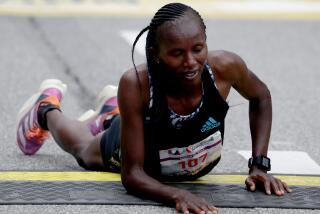Race a Metaphor for Prime Minister’s Wavering Regime : For Gandhi, Ruling India Is a Marathon
- Share via
NEW DELHI — As India’s Prime Minister Rajiv Gandhi, clad in sweat suit and running shoes, tried to bring down the flag to kick off the second annual New Delhi Marathon, members of an Indian martial arts troop began chopping away at each other near the starting gate while Rajasthani holy men pounded on ancient drums and a tribal group from Gujarat state tossed coconuts into the air and split them in half with swords above their heads.
With such goings-on, hardly anyone seemed to notice as the more than 200,000 runners took off Saturday down stately Raj Path Boulevard, many stumbling, some getting trampled and all of them forming a human wall that even Gandhi, still clasping the starting flag, was unable to penetrate.
Then he tried to join the 26-mile race while a dozen or so of his security guards, all attired in matching sky-blue running suits, struggled in vain to keep up. The prime minister ran all of 200 yards before he, too, gave out.
So on Sunday, there was a lot of criticism--not just of Gandhi’s running but also of his Italian wife, Sonia, who showed up for the marathon in red high-heeled shoes, clearly not prepared to do any running herself.
Thus the New Delhi Marathon, dedicated to Gandhi’s late grandfather Jawaharlal Nehru, father of the Indian nation, was more than a colorful illustration of India’s great, often anarchistic, democracy. It was, in a way, a symbol of the prime minister’s increasingly weak political hold in this critical election year, as opposition forces attempt to cast him as an alien in his own land.
Gandhi’s participation in the marathon was designed to display his youth, physical vigor and grass-roots appeal, but some of New Delhi’s newspapers Sunday called it a “cheap political stunt.”
In fact, most of the nation’s press chose to feature a protest run organized by several student opposition groups to coincide with the marathon. The protesters wore T-shirts bearing such slogans as “Curb Inflation” and “Down With Corruption.”
Government’s Insensitivity
Organizers said their run was staged to protest the government’s insensitivity in sponsoring an expensive event while the country continues to suffer from poverty, inflation and official corruption.
Gandhi’s woes were alluded to when, at one point before the marathon began, he was invited to speak to the crowd but declined. “This is not a day for speeches,” Gandhi said curtly. That prompted a government official nearby to comment, “There have already been too many speeches this week.”
Indeed, Gandhi and his four-year-old government came under unprecedented attack in Parliament last week.
After India’s figurehead president, Ramaswami Venkataraman, spoke to the nation Thursday about the accomplishments of Gandhi’s administration, a routine motion was made in Parliament to thank the president for his speech. Instead, there was a heated debate.
“The (president’s) address has failed miserably to point out some burning issues and problems in this country,” declared opposition member Somnath Chaterjee. “The address is as aimless, as colorless and as useless as this government has been.
“The address appropriately sounds like a swan song of a government which is in its last stages, a government which has now proved itself to be a non-functioning and inefficient government charged with corruption at the highest level, seething under dissension inside the party and ruling under serious charges of malfunctioning and malfeasance.”
Commenting on a text of the president’s speech, another opposition member said: “I was a student of English literature. But I have to relearn English after seeing this document.”
The attacks came from an opposition that is trying to unify itself under an umbrella group called the National Front and climaxed several months of key political losses for Gandhi’s ruling Congress-I party in regional elections.
At the heart of opposition criticism is the allegation that Gandhi, a former airline pilot who reluctantly but successfully campaigned for the prime minister’s post after the 1984 assassination of his mother, Indira, has become an elitist, aloof from the nation he governs.
Defending himself in Parliament last Friday, Gandhi stressed that he recently had driven more than 200 miles across India’s violence-riddled northern state of Punjab, where Sikh extremists have been fighting for a separate state. “Every time I stopped, I talked to the people,” he said. “ . . . I got free of the security people.”
Gandhi spoke for nearly two hours about the achievements of his administration, citing the neutralization of the Punjab conflict, extensive programs for the poor and unemployed and an economic growth rate of more than 3% in a drought-ridden year.
At the scene of Saturday’s protest run, however, organizers remained unconvinced.
After running to the site of an ancient rock placed to mark the spot where Indira Gandhi was cremated, Ashish Sood, president of the Delhi University Student Union, issued a statement declaring the government is spending tens of millions of rupees for “jamborees like the (New Delhi Marathon) while it ignores poverty, unemployment, inflation, terrorism, corruption and the many other problems facing the Indian masses.”
When the official marathon finally ended late in the afternoon, there was still another cause for criticism. Among the top 10 finishers in the race, which was won by Briton Tony Simmons, there was only one Indian.
More to Read
Sign up for Essential California
The most important California stories and recommendations in your inbox every morning.
You may occasionally receive promotional content from the Los Angeles Times.













